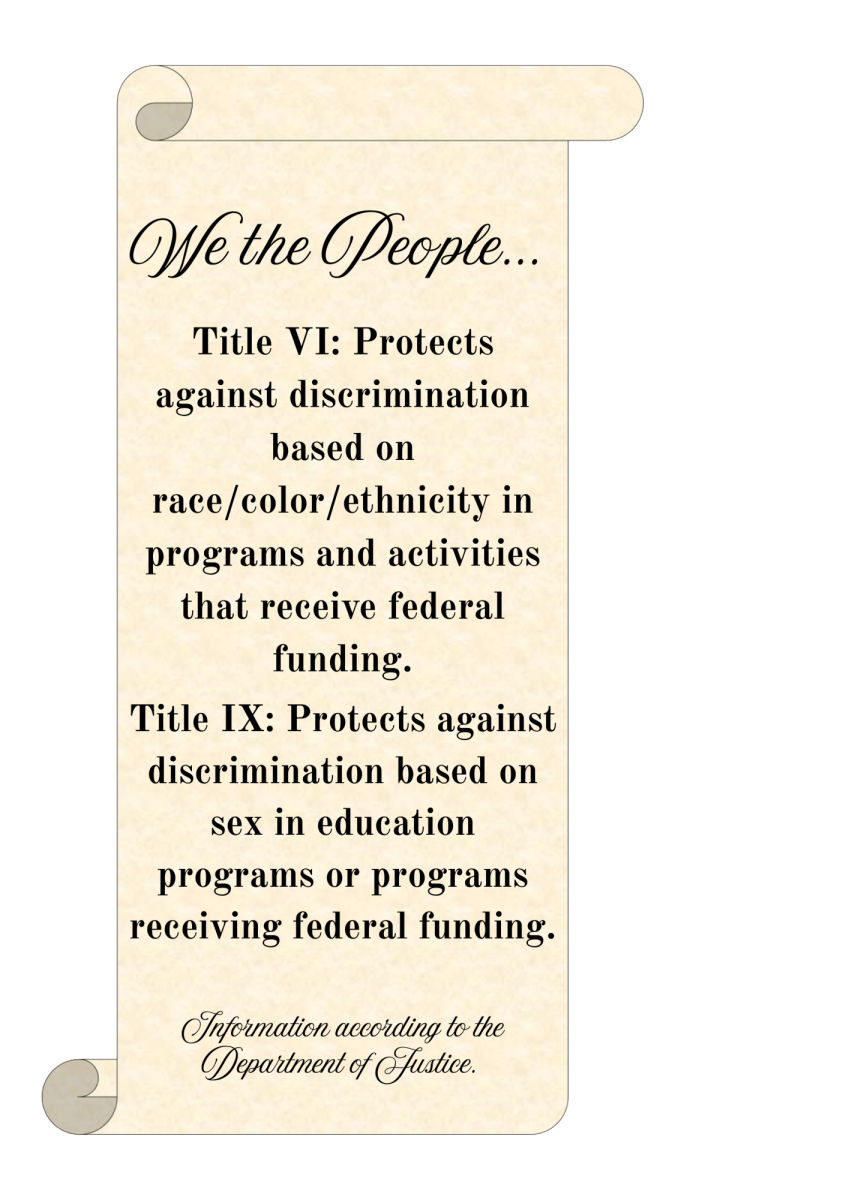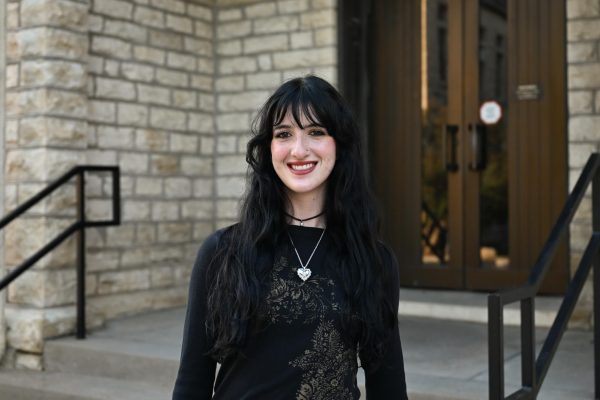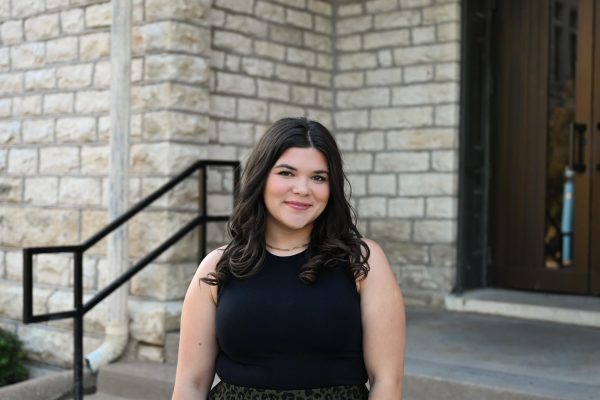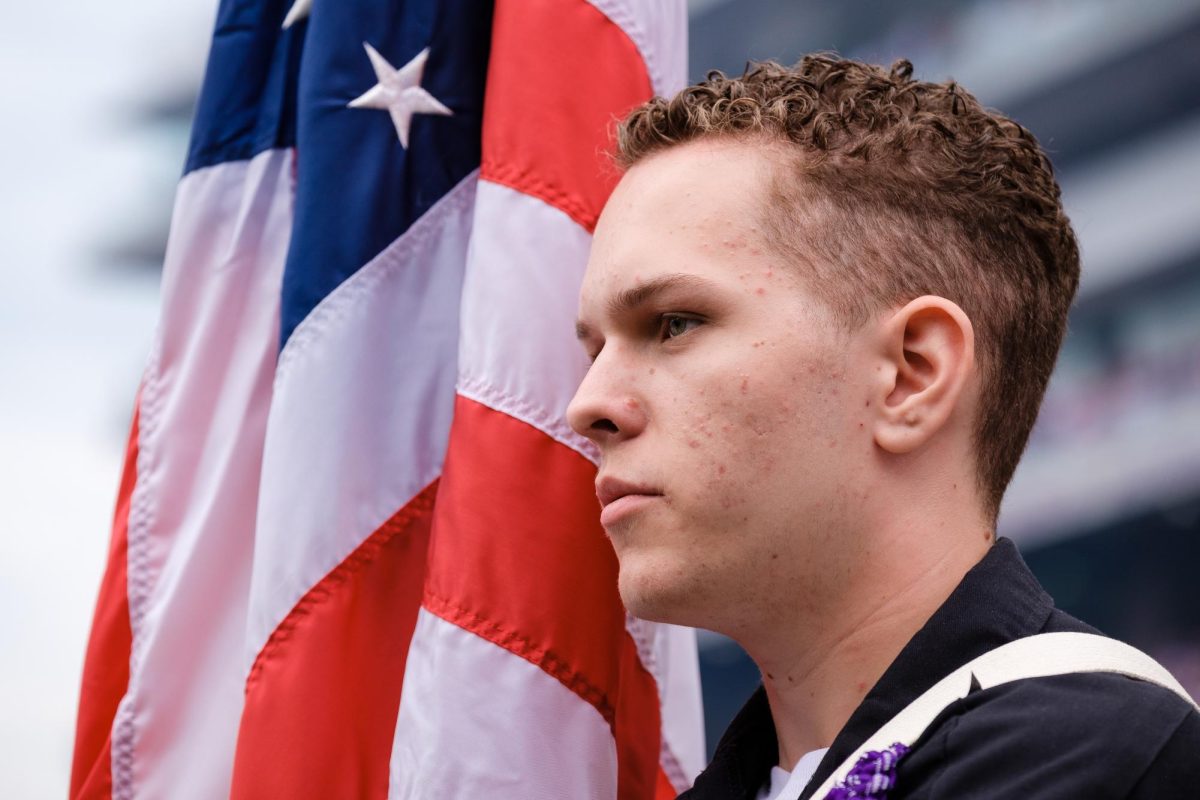The Kansas State chapter of the Young America’s Foundation filed a formal complaint to the Kansas City Office of Civil Rights in March, claiming K-State violates “Title VI, Title IX and Recent Trump Administration Executive Orders” by discriminating against conservative students and keeping Diversity, Equity, Inclusion and Belonging programs in place.
According to the civil rights complaint, “YAF activists face significant discrimination on campus, where extremist administrators and faculty use so-called and often self-appointed authority to block conservative speech.”
Thomas Adcock, founding chairman of YAF at K-State, said student response to the complaint was mixed.
“I’ve had a number approach me and thank me for exposing all this,” Adcock said. “They weren’t aware [of] what was going on. A lot of them appreciate what we’ve been doing. We’ve also had some people who obviously disagree with us … and people who are very upset that we’re attacking what they would call their precious DEI and stuff because they don’t understand the full extent of how it actually hurts people and that they themselves could be put on the chopping block of hurting because [they don’t] fit [K-State’s] vision, or someone else’s vision of diversity.”
Derek Jackson, associate vice president for community building, said the university has not made any changes because of the civil rights complaint and plans to continue following government policy.
“For this moment in time, this is business as usual,” Jackson said. “I don’t think our student groups, I don’t think our university has acted inappropriately. I think we’ve done our jobs. If somewhere down the road, somebody tells us to do something different, then we will.”
Jackson said YAF made generalizations in the complaint that won’t result in structural change.
“They’re just throwing a big net, trying to get at whatever their agenda is,” he said.
Adcock said the complaint was partially inspired by difficulties the group faced getting funding to bring conservative speakers to campus.
“Our first speaker we were trying to bring was Daniel Di Martino,” Adcock said. “He was a Venezuelan immigrant who escaped Venezuela, came to the United States, got his citizenship, and he speaks on why socialism is bad. Venezuela was turning into a socialist country, and he lived and experienced that. In order to bring speakers on, or any kind of activities like that, most student organizations reach out to the Student Governing Association to request funds. Well, we found out there were two separate fund groups.”
Adcock said YAF requested funding from SGA’s Diversity Programming Fund to bring Di Martino to K-State in 2023, but were met with roadblocks.
“The only difference between the two fund pools is that the DEIB one, you have to articulate and argue that your speaker or your event relates to diversity, equity and inclusion,” Adcock, senior in history, said. “So, we tried to articulate to them [SGA], ‘Hey, he is an immigrant. He lived in another type of government, and they’re literally, compared to capitalism, like socialism.’ We tried to articulate that and, ‘Oh, he wasn’t diverse enough.’ … Why are the SGA, which is paid with the student service fees, able to have students deciding what it can and cannot fund based off if they determine it is diverse or not?”
Andrew Le, chair of SGA’s DEIB committee, said this protocol exists because students know students best.
“The university has given us a level of autonomy in the sense of how we operate business,” Le, sophomore in political science and leadership studies, said. “The power that is bestowed upon us as a governing body is given to us exclusively by the university. Any day the university could get rid of SGA, but it’s the fact that university administrators have trusted us as student leaders to be good stewards of student dollars, because that’s where we get all our money from that we allocate to serve students.”
Jackson said YAF’s request to receive funding for its event was likely denied because it didn’t meet the criteria required to access DEIB funding, an approximate $137,000 pool.
“That DEIB fund, the student government allocates the money and then it’s also then going through another level of support and scrutiny through that DEIB committee that works into the challenges and opportunities of how you spend the money,” Jackson said. “There are specific rules in the student government about what that money can be used for and not be used for. They walk that line really closely.”
According to the SGA website, funding through Diversity Programming is limited to campus events “with educational value that are intended to provide cross-cultural learning experiences or education on the topics of diversity, inclusion or discrimination based on race, ethnicity, religion, gender, disability, sexual orientation, socioeconomic status, geographic location or age.” Events must also be held on campus and “free and open to all Kansas State University students.”
However, YAF has utilized the Diversity Programming fund to bring other activists to campus, Le said.
“I think that’s the one thing that I think is really important to note here is this last year we allocated about $3,600 to them on Sept. 16 for Yeonmi Park to come talk about her life in North Korea, and last year we allocated, I think, roughly around 5,000 or so to Young Americans for Freedom to bring Chloe Cole on campus,” he said.
Amy Lee, accountant for SGA, could not be reached for comment. Le said the fact they provided YAF with funds supports SGA’s aim to support all students, regardless of political belief.
“I will say, I think that’s a testament to the work that we do as a committee, that we’re open and accessible to everyone regardless of where their stances might be,” he said.
Adcock said he was also dismissed by the university when he complained that students erased YAF’s promotional chalking on Bosco Plaza, an act prohibited under section .070 of the K-State Publicity Regulations.
“All our chalk we did the day prior to our Seth Gruber event — we had spent eight hours chalking, got done around 10 o’clock at night, and by the next morning the entire plaza of our chalk was completely destroyed on there,” Adcock said. “The school’s impediment policy states such as that you cannot destroy other people’s chalk; it’s called vandalism on there. This is the school’s own policy, but yet the school has no way of enforcing their own policy.”
YAF is also concerned that instead of removing DEIB programs to comply with executive orders, K-State is changing the wording of its websites and policies. According to the complaint, “Kansas State has renamed its DEI office in attempt to circumvent federal law. The DEI office continues to divide people by impermissible methods such as race and sexual ‘identities,’ as evidenced in part by their ‘social identity wheel.’ The existence and practices of this DEI office violate Title VI, Title IX, Executive Order No. 14151, Executive Order No. 14173, Executive Order No. 14168 and the Dept. of Ed. Feb. 14, 2025 Dear Colleague Letter.”
Le said SGA renamed its DEIB fund to the Community Engagement fund to comply with federal orders, and did so not to circumvent regulations, but to “further clarify the work that [they] do.”
“I think a lot of people have the notion that our funding is only for multicultural student orgs and whatnot, but it’s open and available to anyone — anyone and everyone,” Le said. “In staying with the Committee Programming fund, it helps clarify the work that we do. The money is used to help student organizations host events that may want to offer a different perspective. Especially a lot of the MSOs host different cultural events for folks to kind of get immersed in these different perspectives and cultural differences, but also building community within K-State as well.”
YAF’s complaint states K-State violates Title VI, which “prohibits discrimination on the basis of race, color and national origin in programs and activities receiving federal financial assistance,” by prioritizing hiring people of color for faculty positions.
According to K-State’s Access and Opportunity plan under Theme 4, the university aims to “Increase the hiring and retention efforts for faculty and staff of color to meet or exceed relevant local, state and national labor market for faculty and staff from historically underrepresented and underserved populations.”
Adcock said this goal would close spots that could be filled by qualified white people.
“You’re putting a factor in there that they have to meet some requirements and stuff, including a skin color, to meet metrics for the nation,” Adcock said. “That is of concern. We live in a country where you don’t get judged based off the color of your skin. It’d be wrong for the school to say we need to hire more white professors because they’re white, or white faculty members. No, you can’t say that. Equally, you can’t do it for the opposite side, saying we need to hire more black, or brown or fill-in-the-blank.”
Le said these policies don’t encourage discrimination, but rather provide opportunities for people who may be overlooked otherwise.
“I just think it’s the unfortunate part of living in the world that we live in, is that we aren’t a color-blind world,” Le said. “That’s just how it is. We must face the reality that there are different barriers that different students face, different challenges that different students face, and so it’s these programs that really help in times of need whenever those students really need it to feel like they’re welcome here.”
Adcock said YAF’s complaint wasn’t meant to target multicultural groups on campus.
“You as a student group and stuff, if you want to get together and say, ‘We want to form a transgender club ourselves’ and stuff, that’s fine,” Adcock said. “The school’s hosting a drag show. I mean, I have my own personal problems with that, but I’m not going to ever eliminate someone’s freedom of speech.”
Adcock said he also wants to educate people about DEIB.
“People hear DEI, they think it encompasses a lot more than it does,” Adcock said. “A lot of times, I’ll hear through comments on Facebook or whatnot that DEI promotes the veterans and stuff. Actually, no, that’s the VA. Or, it protects those with disabilities. No, that’s the Americans with Disability Act. There’s lots of misinformation as it relates to, I guess, people will see headlines and they read headlines. It’s very clickbait-y and stuff, and it’s talking points that a lot of people don’t do their own research.”
Le said he disagrees, and DEIB is important for a vast demographic of students and staff.
“I remember the first day I came on campus, and I was just scared because no one else looked like me,” Le said. “No one else shared the same cultural values as me. No one else really had the same upbringing as I did. It was groups like the Asian-American Student Union, it was this committee that I served on prior to being the chair of, that fostered that sense of community for me, like this is where I can thrive. Again, I think that’s the most important thing, and I think that’s what the university’s focused on, is creating an environment where students thrive.”
As a result of the complaint, Adcock hopes to see K-State completely remove DEIB positions and policies.
“In a perfect world, the whole nation [recognizes] that DEI itself has been tested for at least four years now and is shown to be very discriminatory, that to just end all these DEI requirements and stuff and base everything off of merit alone [would be best],” he said.
Above all else, Adcock said the number-one concern of YAF is freedom of speech.
“Free speech is important, first and foremost, and if we’re using the word diversity, true diversity is a diversity of thought,” Adcock said. “The only diversity that matters is the diversity of thought.”



























































































































Whistleblower • Apr 4, 2025 at 12:59 pm
The DEIB committees is basically it’s own branch in Student Government. In that it allocates money without ANY APPROVAL from the Senate or the Student Body President. Plus, they allocate a larger pool of funds. The Student Allocations Committees has only $30,000 or so to allocate to non DEIB events around campus. Meanwhile the DEIB is has access to $137,000 to give to diversity, equity, inclusion, and belonging. The lack of oversight allows the DEIB Committee to allocate HUGE sums of money to organizations. This is extremely unfair for any club that doesn’t meet the criteria for DEIB. Everyone pays into the fund, why doesn’t everyone get fair access? Why do DEIB clubs get more money and a lower bar than everyone else? For example, the DEIB recently allocated $10,200 for a DRAG SHOW. How does that provide any educational opportunity on campus? The event which is a hyper sexual event should not be allowed on campus, let alone receive $10,000 for it. Something needs to change.